Hugh Beaumont: Get to Know the Dad from 'Leave It to Beaver'
By the time he had been signed to play patriarch Ward Cleaver on Leave It to Beaver, Hugh Beaumont had been walking quite the challenging tightrope between playing movie tough guys — including private detective Michael Shayne in five movies between 1946 and 1947 — while also serving as a minister when he wasn't in front of the cameras.
"Sometimes my work as an actor presents a conflict with my ideals as a clergyman," Hugh Beaumont admitted to The Herald-Sun in 1946. "I don't believe in the old saying that the end justifies the means, and no money that I can earn as an actor can accomplish so much good that I would be justified in violating my ideals to earn it. So far, I have been fortunate, for the conflicts have been only minor. If the question arises in a serious way, of course, I would have to give up my acting."
Dave Sundstrom, a YouTube user whose efforts provide insightful commentary on TV, movies and music from the 1960s through the 1980s, says of Hugh in one of his videos, “He wanted to be an actor just about as much as he wanted to be a man of God. So at some point he decided he could do both; though, when given the opportunity, he would definitely preach."
Jerry Mathers, who, of course, played young Theodore "Beaver" Cleaver on the 1957 to 1963 series, points out that Beaumont had a "long and illustrious career" beyond the sitcom, saying of the Shayne character, "He was a hard-drinking, heavy cigarette-smoking detective in this part, in the style of Mickey Spillane. But I think he was much more comfortable as Ward Cleaver, because it fit his real-life personality so much better."
Sussman adds, "During breaks between jobs, Hugh and his family — wife Kathy and their three kids — would spend their time in Minnesota far away from the entertainment industry, and all of the trappings that came along with it. Hugh absolutely loved the time away. It allowed him to focus on being a better man, a better husband to Kathy and a better father to his kids."
MUST-READ: Leave It to Beaver Cast — Find Out About the Cleaver Family
For Hugh Beaumont, it all began in Kansas
He was born Eugene Hugh Beaumont on February 16, 1909 in Eudora, Kansas. His father a traveling salesman, the family often moved around — though they did settle down long enough in Tennessee for him to graduate from Chattanooga’s Baylor School, followed by his attending the University of Chattanooga. He would eventually transfer to the University of Southern California where, in 1946, he graduated with a Master of Theology degree.
In a profile published in 1946, The Herald-Sun filled in some background: "Hugh Beaumont became interested in acting in 1931 before religion had touched him. Born in Alabama, he had been raised a Baptist. He worked in little theaters, on the radio and as a master of ceremonies at night clubs. Beaumont married the daughter of a Methodist minister who is also a sister of another minister, and through them he made the discovery, as he tells it, that religion can be a broader thing than the hide-bound dogmas of old-style religion."
An earlier profile, from a 1940 edition of The Tampa Times, details, "He has his own church where, as Reverend Beaumont, he holds services every Sunday. Why is he working in a movie? He is acting for the purpose of getting enough to complete his religious training. He also has many needy people in his parish. 'When I am a full-fledged minister,' he said, 'I am giving up the movies."
It didn't exactly work out that way. He made his way to movie screen in 1940's Phantom Raiders in a role that was uncredited. In fact, many of them were between then and 1953. However, there were a few actual characters along the way, oftentimes in gangster films or those in which he played the aforementioned private detective.
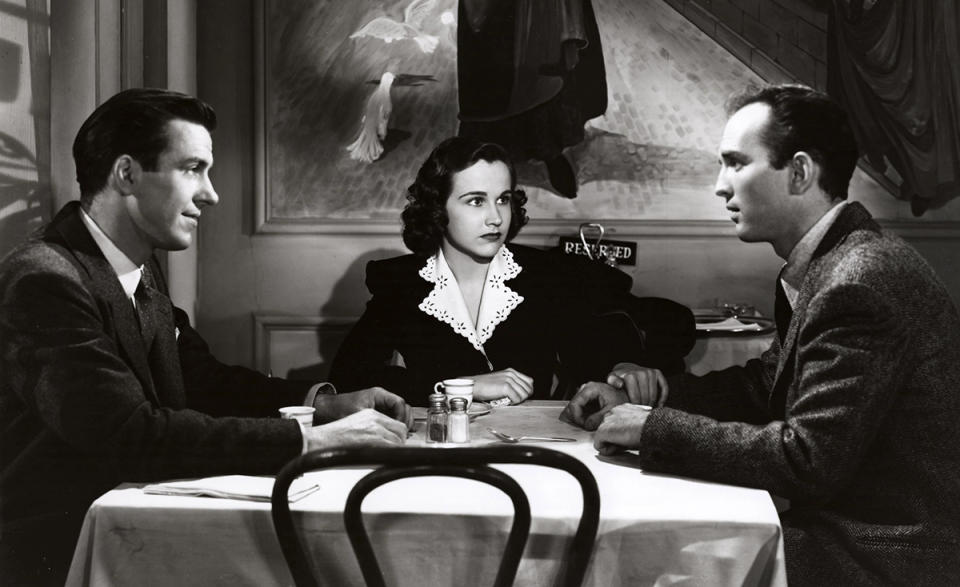
?RKo Radio Pictures/courtesy MovieStillsDB.com
Pointed out the Star Tribune in 1947, "Since 1944 he's played the starring role in the Michael Shayne detective series. He's played assorted good-looking hoodlums in other films. The word from Hollywood is that his congregations don't mind a bit. The only people who are bothered by his dual professions are fellow actors. They're timid about swewaring when he's around.
"Unlike other preachers," they added, "Mr. Beaumont doesn't preach against gangster films. 'Many films, such as mine, are frivolous,' he admitted. 'They don't do any good. But I wouldn't say they're downright harmful. And it doesn't hurt for a preacher to be a little bit of an actor.'"
There would be a total of 86 movies before Leave It to Beaver, and only one after it was over (1965's The Human Duplicators). Television seemed to offer many more opportunities, Hugh Beaumont making his debut in the medium with a 1950 episode of The Silver Theatre and include 55 guest appearances and two TV movies, culminating with 1957's Tales of Well Fargo.
Leave It to Beaver
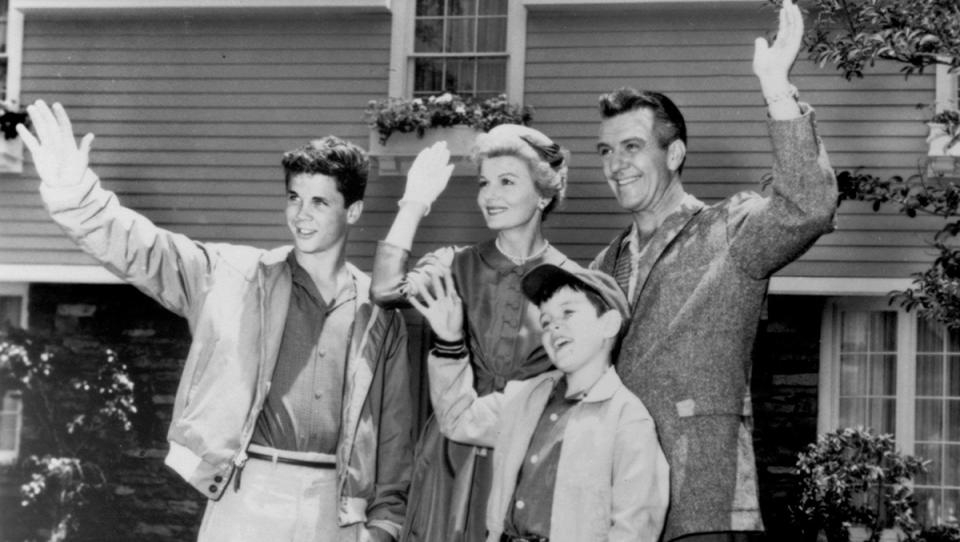
?CBS/courtesy MovieStillsDB.com
The TV series Leave It to Beaver arrived in 1957, capturing the same sort of audience yearning for a family sitcom that had turned Father Knows Best into such a hit from 1954 to 1960. The show focuses on the Cleaver clan, consisting of parents Ward and June (Barbara Billingsley) and their two sons, Wally (Tony Dow) and Theodore (Jerry Mathers), aka "The Beaver."
MUST-READ: Jerry Mathers Remembers Leave It to Beaver, His Co-Stars and More (EXCLUSIVE)
Television historian Jim Colucci, who has authored such books as Golden Girls Forever: An Unauthorized Look Behind the Lanai and, with Norman Lear, All in the Family: The Show That Changed Television, sees the arrival of the show from an historical point of view:
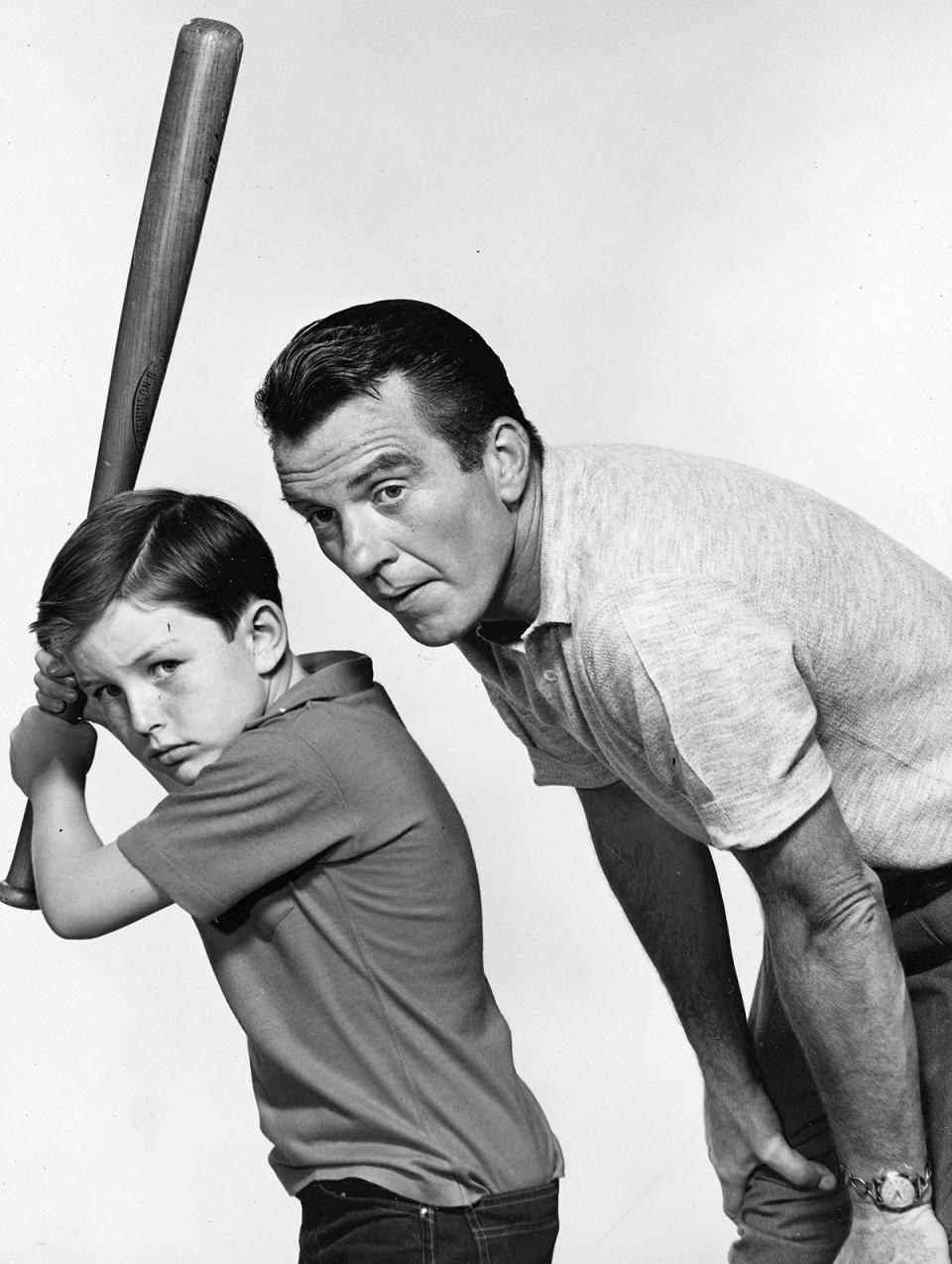
?CBS/courtesy MovieStillsDB.com
"Obviously, after World War II, everybody wanted this domestic peaceful life, and then the Korean War came and so more kids were being sent overseas to die. By the time 1957 came about, we were really at the point where America wanted this perfect, calm, peaceful life. Add to that, it was the perfect confluence, because this was the decade when TV was being invented. All of these things we now take for granted, like the family sitcom, were being done for the first time."
It's his opinion that the writers behind the show had the task of cranking out product week after week and they weren't thinking about posterity — reruns still weren't really a thing — but people like Ward and June Cleaver nonetheless influenced the psyche of many generations of American kids about what parents should be.
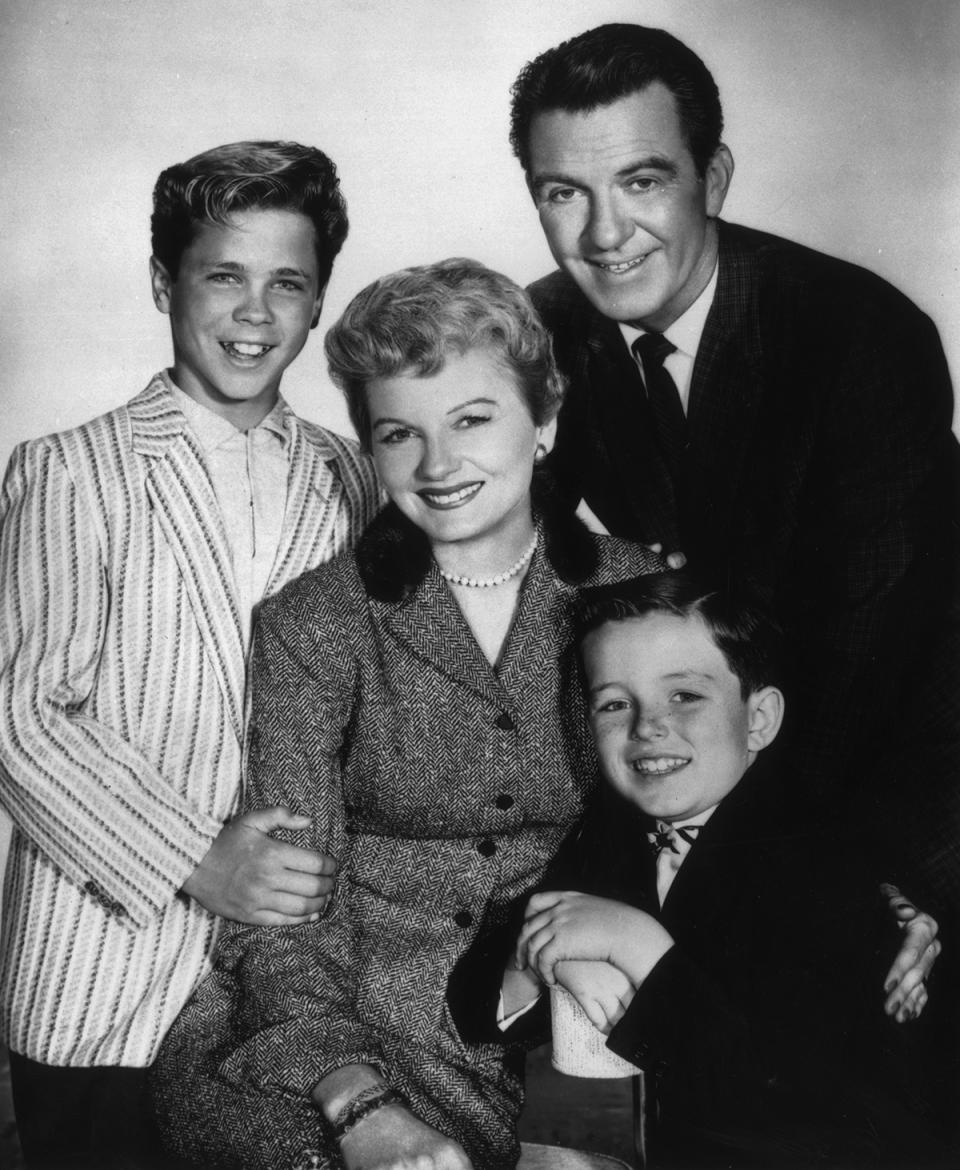
CBS Photo Archive/Getty Images
"When 1957 came around," he muses, "we wanted this conservative nuclear family that were back to basics, xenophobic, white, Protestant — probably some undetermined denomination — family as our ideal. And Hugh Beaumont fit those slippers and cardigan sweaters perfectly. We wanted vanilla and his name is Beaumont, he's partly French. I think he was the perfect French vanilla in that he really embodied what we wanted an American dad to be. And what we wanted masculinity to be at that moment is that we'd had enough of the soldier covered in mud in the trenches, and now we wanted a man to be sophisticated and civilized and be the stabilizing, safe, protective force for kids."
MUST-READ: What Happened to the Father Knows Best Cast Before, During and After the Show
Hugh Beaumont: A God-Given Role?
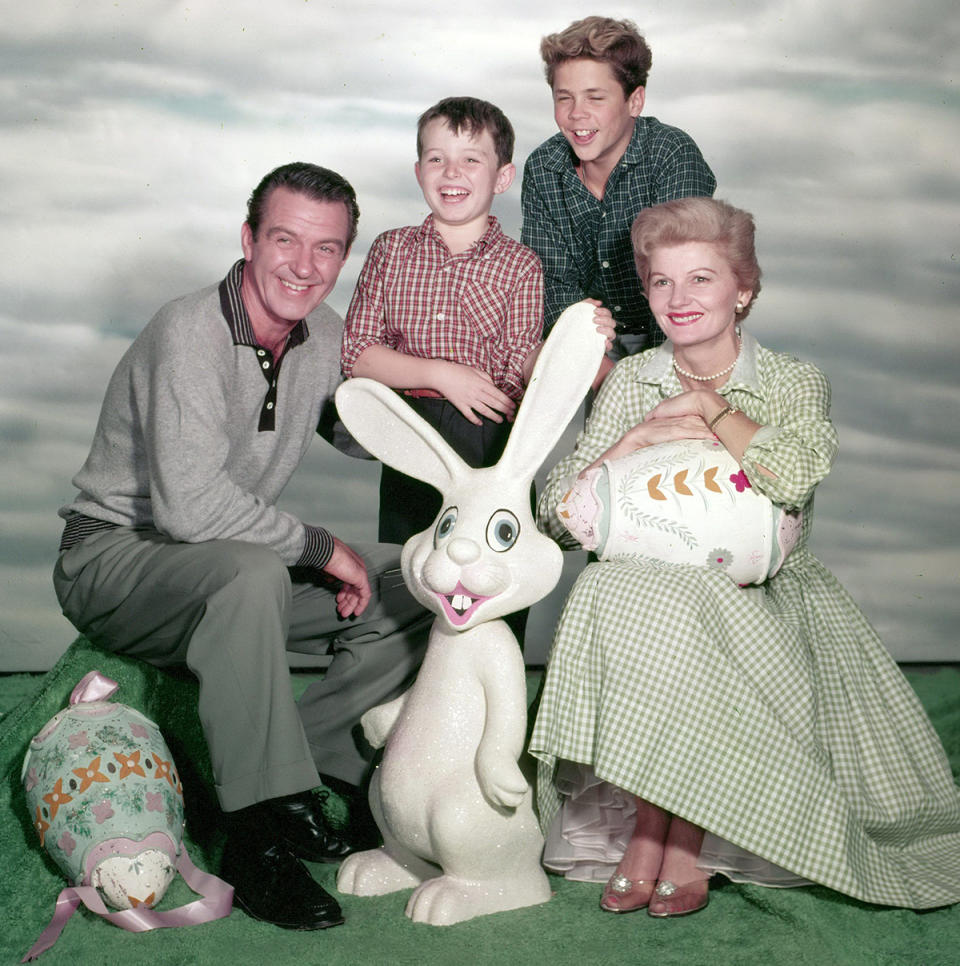
?CBS/courtesy MovieStillsDB.com
Brian Humek, author of Ward's Words: Advice and Wisdom from the Heart of America's Favorite Father and The World Famous Beaverpedia, is the one who suggests that Ward Cleaver may have been a God-given role to Hugh Beaumont.
"A few months before the filming of Leave It to Beaver began," says Humek, "Jerry Mathers and Hugh Beaumont acted in what we would now call an informercial for a cemetary. Well, the pilot for the show had already been filmed and they were now looking to recast the Ward Cleaver character. Jerry Mathers' mom told Beaumont about the opportunity and that night, when Jerry said his bedtime prayers with his mom, he prayed that God would let that nice man he worked with early that day get the new job as his father on the show."
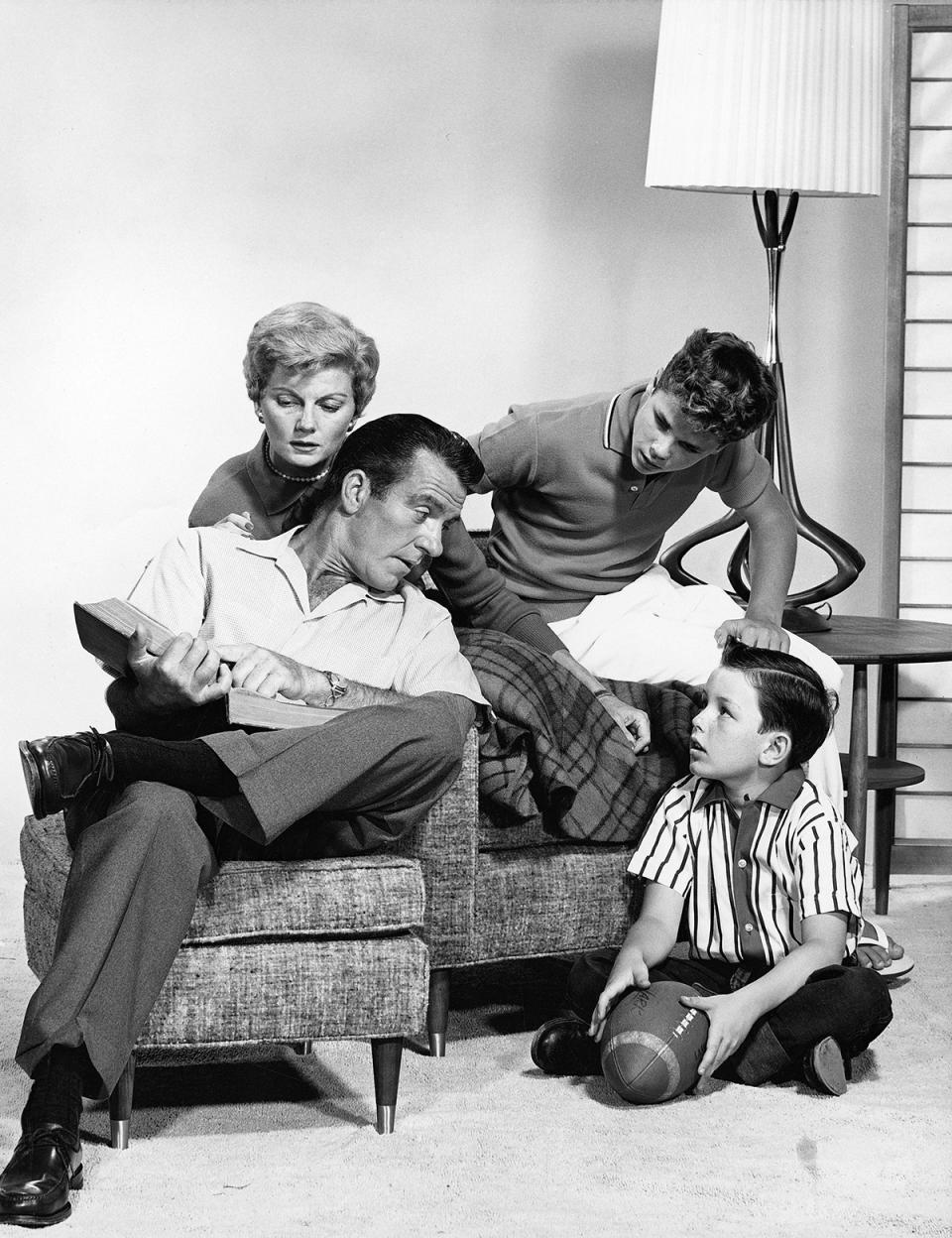
?CBS/courtesy MovieStillsDB.com
For his part, on his official website, Mathers offers, “One thing I remember is that during a scene I was supposed to cry on cue. Hugh asked me if I had ever done that before and I told him no. He said, ‘Put your face into your hands and laugh really hard. It’s an old actor’s trick, because the sound of laughter and crying are very closely related.’ Sure enough, I tried it and it worked!
"When we shot the pilot of Leave It to Beaver, Hugh was not the original father. But, when they re-cast the role for the series, Hugh was one of several people brought in for an audition. I was so happy because he was the nice man that I worked with. So, when we read a short scene together, we had a good chemistry and Hugh got the part of Ward Cleaver. I was very glad that he was picked for the role and we had a wonderful friendship for his entire life. Hugh and my dad had become friends and he occasionally came to our house to play cards with my father and some of his friends.”
Beaumont himself seemed pleased to have gotten the role and what Ward ultimately represented. "I'm glad the creators and writers of our series made Ward Cleaver the head of the family," he told The Morning Call in 1959. "The man who earns the bread and solves the problems of his dependents. Our country grew and prospered under this kind of man and I'm sorry to see fathers losing the respect of their children. That's one of our biggest problems today, and a lot of it can be traced to the downgrading of fathers for the sake of a slapstick laugh.
"I like the way Ward Cleaver handles his children," he elaborated. "Ward tries to be fair and just. When he makes a mistake in judgment, he apologizes sincerely and that's the end of it. If he has to call off a family picnic or outing, he explains why. His boys know him well enough so that the old 'but you promised' isn't heard."
Colucci opines, "If you were a little kid like Beaver, whose nature is to get into trouble, what kind of dad do you want to come home to? You want to come home to the understanding dad who might lecture in a way that will uplift you and enlighten you, but he is not going to spank you. Everybody, even in today's modern times, can look at Ward Cleaver and we know it's sanitizied and we know it's ridiculous and we know it's literally whitewashed, but there's something about ward that we would want in a dad."
MUST-READ: 1950s TV Sitcoms — 40 Classic (and Not So Classic) Shows, and Where to Stream Themhttps://www.firstforwomen.com/posts/entertainment/1950s-tv-sitcoms
When the Record-Journal spoke with him in 1962, they wrote, "As Beaver's father on the show, Hugh Beaumont finds he has a 'pretty easy acting chore. It's just like I was bringing up my own three youngsters. Beaver and Wally have the same problems they have or had. Sometimes I don't even think I need a script, it all sounds so familiar.'"
Hugh Beaumont: Life Beyond the Beav
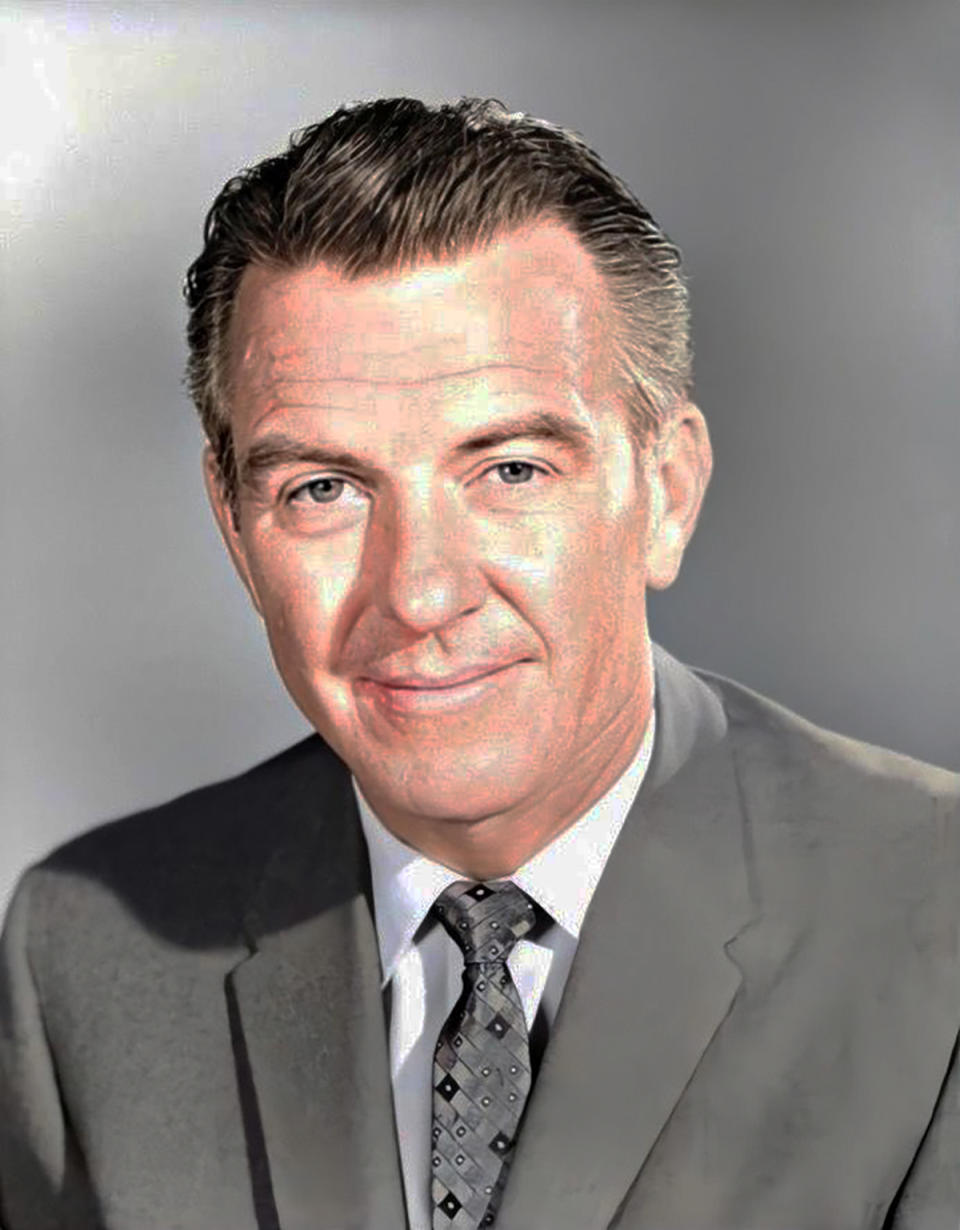
Find a Grave.com
Lest anyone think the actor left the minister behind by that point, he told The Marlon Star in 1961, "On the few occasions a year when I'm invited to preach, I always caution the minister of the church not to introduce me, and I also explain in advance that there will be no autographs after the service. When I go to church to preach a sermon, I go as a preacher, not as an actor. When I'm being interviewed as an actor on a TV series, I don't want to trade on my church work."
MUST-READ: The 1960s — Your Guide to 60 Classic (and Not So Classic) TV Sitcoms and Where to Stream Them
Following the end of Leave It to Beaver in 1963, Beaumont made more TV guest appearances and starred in a number of community theater productions. Gradually, though, he moved away from show business and actually became a Christmas tree farmer in Grand Rapids, Minnesota. The assumption is that the move away from acting (as well as writing and directing, which he had begun to have some success with) was precipitated by a stroke in 1972 from which he never fully recovered.
He had married married Kathryn Adams Doty in 1941 and they remained so until their divorce in 1974. They are the parents to three children: Hunter, Kristy and Mark. Hugh Beaumont died of a heart attack on May 14, 1982.
Comments Dave Sundstrom, “He believed that the God that he had studied all those years, the God that he had preached about, the God that had been there to comfort him, well, he believed that that God didn’t care much about Hugh Beaumont the movie and TV star. He cared about Hugh Beaumont the man, and even more specifically what was in that man’s heart. He passed away in 1982 from a heart attack. He was with family visiting his older son, Hunter, in Munich, Germany. When word got out about his death, the man was remembered by his family and friends, not for his onscreen accomplishments, but rather for the overwhelmingly positive impact that he’d had on each one of them. And those feelings extended to his television family as well. They were right there, mourning alongside his family as one.”
Sadly, he didn’t live long enough to reprise his role of Ward Cleaver in the TV movie Still the Beaver or the subsequent series The New Leave It to Beaver, although the film was dedicated to his memory. But for Colucci, memories of the actor/preacher continue to linger on.
"The fact that he became a Christmas tree farmer on an island in Minnesota — there's just something so wholesome about everything you hear about him," he says. "There are certainly TV dads — Bill Cosby! — who play wholesome, and then you find out the complete opposite. But it's interesting when someone is the real deal of what they're known for. And it seems like he was pretty authentic, and anything that he played that was darker or heavier, was a stretch. Ward Cleaver was him getting to bring his own real gifts to the world.
"A lot of people," Colucci closes, "could watch Leave It to Beaver and think, 'How could you find this corniness as a gift to the world?' But it really is, and it really was in terms of whatever hopes and aspirations it gave to people; whatever feelings of safety and comfort it gave and still gives to people. That comes emanating out of those actors. And in a nuclear family, it starts with dad."
